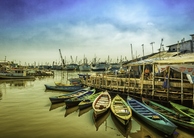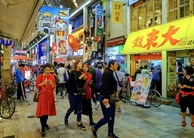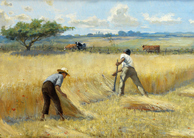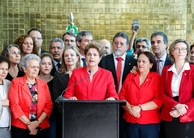Featured Article:Inequality and Corruption: Drivers of Tunisia's Revolution
By
2014, Vol. 6 No. 10 | pg. 2/2 | « Prebendalism and Economic Inequality: Positive ReinforcementTunisia’s high levels of public corruption enabled massive concentration of wealth at the top that has aggravated inequality. Richard Joseph coined the term prebendalism to describe elected officials’ appropriation of public office. Such officials regard public office as personal property meant for private benefit or the dispensing of patronage (Joseph). Ben Ali’s regime was characterized by narrow prebendalism, in which benefits were provided to an increasingly small inner circle of family members, most notoriously the extended family of his second wife, Leila Ben Ali. To illustrate, in 2009, the winner and runner-up of a state auction for Tunisia’s third mobile phone license were both companies owned by husbands of Ben Ali’s daughters. In addition, the local dealerships of Fiat, Ford, Jaguar, Volkswagen, Audi, Seat, Land Rover, Hummer, Porsche and Mercedes were all owned by either the same two aforementioned relatives or by Leila Ben Ali’s brother (Noueihed and Warren 28). Belhassen Trabelsi, one of Leila’s 10 known siblings, was the owner of an airline, several hotels, one of Tunisia’s two private radio stations, car assembly plans, Ford distribution, a real estate company and more. In a July 2009 diplomatic cable, the U.S. Ambassador to Tunisia acknowledged that the rise in corruption of Ben Ali’s inner-circle stood in stark contrast to the growing inequities, which risked the regime’s long-term stability ("Viewing cable 08TUNIS679”). The highly corrupt inner circle and favoritism toward extended family members increased the concentration of wealth in the hands of a few. This prebendalist, personalized economy transcended high-level incidents and created a culture and system that favored corruption. The existence of a myriad of different business licenses and export approvals allowed the regime to provide selective patronage to loyalists. In addition, the regime frequently turned a blind eye toward small-unsophisticated firms’ tax evasion practices (Achy 10). The lack of centralized tax collection allowed local officials to extort bribes from these microenterprises that were otherwise untaxed and untouched by government. Importantly, the Ben Ali regime was known for its mastery of using government-sponsored nongovernmental organizations (Achy 14). Such organizations, such as Leila Ben Ali’s favored Bessma Society for the Handicapped, allowed the government to provide social services and favors in exchange for support of the regime. Tax evasion, bribe extortion and a network of patronage-granting NGOs created a widespread culture of clientalism and prebendalism. A major source of the economy, mining, represents the connection between prebendalism and economic inequality. In 2008, corruption in the regime’s allocation of jobs as personal favors in the Gafsa Phosphate Company led to strikes and six months of street fights, with security forces eventually laying siege to Gafsa (Saleh). Continued protests during Ennahda’s rule over corruption in the mining industry suggest that prebendalism is a state-level rather than government-level problem. In February 2014, 60 agricultural workers, some of them elderly workers without contracts, went on strikes to prevent phosphates from leaving plants in Redeyef, central Tunisia (Saleh). These workers, and others in Gafsa, accused Ennahda of making appointments on the basis of political loyalty to the state-run Gafsa Phosphate Company (Saleh). Mining-rich areas, plagued by higher unemployment rates as compared to the coastal region, illustrate the impact of corruption on regional inequalities.The regional inequities and discontent in the mining industry represent a serious challenge to Tunisia economy during a critical time of democratic consolidation. Tunisia is the world’s second largest producer and leading exporter of trisodium phosphate, with 21.7 percent of global production and 31.2 percent of global exports ("Tunisia Economic Outlook"). However, the price of phosphate continues to decline from its peak of $430 per metric ton in September 2008 to $103 in February 2014 ("Rock Phosphate Monthly Price”). Not only is the price of phosphate declining, but labor strikes in the phosphate-rich Gafsa region and central Tunisia have also cut production. Stoppages due to strikes have reduced output from an annual average of 7.5 million tons before the 2011 revolution, to 3.3 million in 2013 (Saleh). Labor strikes and stoppages have reduced sales in an important industry for Tunisia’s inland economy. The declining performance of the essential phosphate industry poses a serious challenge to Tunisia’s prospects for reducing discontent and violence during a critical time of democratic consolidation. Economic Inequality and Violence Threaten Democratic ConsolidationIt can be argued that rising economic inequality and unemployment will not hurt Tunisia’s democratization, since democracies are more suited than authoritarian regimes to surviving economic crises. In sharp recessions, honest and nonviolent elections act as an institutional mechanism to preserve the democratic regime by providing citizens with an outlet to voice their concerns over governance. In contrast, authoritarian regimes that lack in performance legitimacy face a higher risk of overthrow. Larry Diamond’s analysis of 34 countries following the 2008 economic crisis, as well as analysis of various regimes that were overthrown in the 21st century, corroborates this well-known idea of democracy acting as a safety-valve for poor economic performance (Diamond). So the argument is that Tunisia’s economic inequality and high unemployment may result in a higher frequency of elections and protests, but not in regime overthrow and a return to authoritarianism. However, Tunisia’s inequality and high unemployment directly leads to violence, which in turn places a risk on the prospects of democratic consolidation. Elections as a safety valve may be more relevant to consolidated democracies rather than recently transitioned-democracies like Tunisia that face high inequality and discontent. After the 2011 revolution, violence has increased in inland regions and threatens the consolidation of democracy. Salafists concentrate in rural and underdeveloped regions located in southern and central Tunisia. Following the 2011 revolution, the hardline Ansar al Sharia in Tunisia group (AST) was created. In August 2013, the Islamist Ennahda government designated the AST as a terrorist organization after claiming to have evidence that the group was responsible for the assassination of two leftist opposition leaders in February 2012 and July 2013 ("BBC News"). The government also claimed AST had collaborated with the al Qaeda in the Islamic Maghreb group. That same month, Islamist militants killed eight Tunisian soldiers in the western border with Algeria leading to a violent government response. Following the Tunisian revolution, violence has spiked especially in the impoverished regions of Tunisia. This increase in inequality and political violence threatens the country’s democratic consolidation. Ennahda and Hamadi Jebali’s resignation in February 2013 following the assassination of opposition leader Chokri Belaid serves as a warning to the political implications of violence. Following the second political assassination of Mohamed Brahmi in July 2013, mass protests and calls for government resignation took place again ("BBC News"). Al Qaida-affiliated groups and AST flourish in the inland, rural areas amongst discontent youth who suffer from unemployment. If political assassinations and fundamentalist violence akin to Lebanon’s situation continues, democratic consolidation in Tunisia will likely not take place. The inequality and discontent that breeds fundamentalist violence is a key threat to Tunisia’s democratic consolidation. Insufficient Anticorruption Measures in Tunisia’s New ConstitutionThe new constitution attempts to address corruption and inequality in Tunisia. Article 10 of the constitution refers directly to corruption stating that Tunisia will work toward reducing corruption, tax evasion and working toward proper use of public funds (“Jasmine Foundation”). In Article 11, the constitution mandates the disclosure of earnings for any member of government and the Chamber of the People’s Deputies or lower house. Article 130 further elaborates on corruption, making a provision for the creation of a Commission for Good Governance and Anti-Corruption. This commission will consist of independent, impartial members “in charge of monitoring cases of corruption within the public and private sectors, investigating and confirming them, and submitting them to the relevant authorities.” Both Islamist and secularist constitution designers attempted to include ways to reduce corruption and the threat it presents to their new democracy. However, the relevant articles do not outline clear mechanisms to ensure the impartiality of the new anti-corruption commission and the overall reduction of corruption. While investigative powers are granted, the language is not clear on whether the commission has the power to initiate a prosecution. As Transparency International highlights, both investigation and prosecution powers are essential for an anticorruption body to be effective (“Transparency International”). In addition, there is no specification of the crucial selection process of officials to this commission. Hence, while the commission may have powers to investigate a case, the ranks may be filled with president appointees and acquaintances. Thus, while the ideas embodied in the constitution are progressive in tackling corruption, clear language on how to attempt to secure these ideas is missing. Essential language on how to keep public spending under scrutiny is missing, yet the document makes promises of grandiose public goods that are unlikely to be fulfilled. Other than article 11 that mandates disclosure of public officials’ incomes, there are no access to information acts or ways to involve civil society in reducing corruption, which have both been set as goals in the anti-corruption roundtable in Tunis, May 30 2013 (“Transparency International”). However, grandiose promises are made. Article 38 promises free health care for poor citizens, preventative health care and treatment for all citizens. Article 45 promises the means for combatting environmental pollution and guarantees the right to a sound and balanced environment. The most developed and rich countries in the world today will likely fail in providing these guarantees. While Tunisia’s budget deficit in 2013 is one of the world’s worst and clientalism has plagued Ben Ali’s 24 year reign, the constitution does not provide any legalized mechanisms to oversee public spending. Policies to Reduce Corruption and ViolenceTo complement current anti-corruption measures, Tunisian politicians must push to create laws that establish the budgeting and selection processes to important institutions. A clear, transparent selection process must be established for both the Commission for Good Governance and the Office of the Ombudsman, the latter established by the Ben Ali regime in 1993. The staff of these offices should not be appointed by the government, but elected by the entire parliament including opposition parties. The election should require a special two-thirds majority in order to ensure that the selection process reflects a consensual process. The term-limits for these positions should be clear and not subject to appeal by regular majorities. The complete annual Ombudsman report and recommendations by these offices should be accessible to journalists and the public. Finally, to ensure the effectiveness of these offices, a law should be enacted that requires the government to allocate a minimum share of the annual budget to these offices. Enacting complementary selection and budgeting laws will increase the chances of adherence to the constitution’s values and principles. A main challenge to transparent public spending is the Court of Accounts, which needs to be depoliticized. The Court of Accounts is responsible for auditing public sector accounts and government expenditures. Currently, the office is under the Council of State, which is headed by the President of Tunisia, Mehdi Jomaa. Thus, the office is subject to severe political interference. Realizing this conflict of interest, the head of the Court of Accounts pledged his commitment to transparency and published the 2011 election campaign financing report (“Tunisia Country Profile”). However, it is not clear if government officials were part of deliberations with the Court of Accounts before the report was made public. To ensure the independence of the Court of Accounts in the long-run, it must not be under the supervision of the government. It should be independent and have authority over government in matters relating to accounting practices rather than vice versa. Protection for whistleblowers must expand in Tunisia in order to reduce complainants’ fears of reprisal. Tunisians project government and politicians to be the most affected by corruption. However, current legislation in Tunisia does not provide whistleblower protection to public sector employees, only to private sector workers (“Tunisia Country Profile”). This legislation must expand in order to cover the prevalent occurrences of public officials demanding profits from private firms or determining appointments at state-owned firms. In addition, a third of households in Tunisia who chose not to report corruption stated fear of consequences as their reason. Procedures for reporting corruption should place anonymity as a top priority. In cases where a whistleblower suffers reprisal, courts must deliver highly severe sentences as a warning for potential criminals and a reassurance for potential whistleblowers of the state’s commitment to protect them. If inequality and corruption continue to breed violence, Tunisia should pursue deeper security reform and request U.N. peacekeeping reinforcement along the Libyan border. With the recent heavy decline in tourism and foreign investment, Tunisia should make sure to reduce al-Qaeda-affiliated and Salafist violence in the Southern region in order to reassure potential tourists and investors. The budget of the inflated police and National Guard should be reduced, while the military budget should be expanded. Military units should be stationed along the Libyan border and trained in border patrol. In addition, Tunisia should request U.N. Peacekeeping forces to reinforce the security of the Libyan border, where most infiltrators enter Tunisia to join other violent groups. The U.N. will likely respond positively both because of the post-civil war situation in Libya and because it will likely seek to help Tunisia fulfill its democratic consolidation and set an example for the region. Shrinking the traditionally large internal security force while expanding the military and its border patrol activities will no doubt minimize violent incidents, which can lead to an increase in tourism and foreign investment. ConclusionInequality and corruption were the key factors behind the 2011 revolution and will continue to challenge Tunisia in the next five to ten years. The structure of the economy, the culture of prebendalism and system of corruption have increased the concentration of wealth in the hands of a few and generated inequality. The real threat to democracy is the fact that economic inequality has led to increased violence in the less-well-off inland regions. In addition, the history of Tunisia has shown that unions play a key role together with Islamists in channeling inequality and discontent toward regime change. Hence, the policy debate should transition from a focus on the Islamist-secularist divide and the role of religion to include constructive recommendations on how to address the huge regional disparities and consequential violence common to both Islamists and secularists. With more constructive feedback on reducing a culture of corruption, rising inequality, and high levels of violence, Tunisia’s ability to complete a democratic consolidation will increase and the Middle East may witness one positive outcome from the so-called Arab Spring. ReferencesAchy, Lachen. "Tunisia's Economic Challenges." Carnegie Endowment for International Peace. December 2011 (2011): 1-28. Web. 16 Mar. 2014. . Bermeo, Nancy G. "Does Electoral Democracy Boost Economic Equality?" Journal of Democracy. 20.4 (2009): 21-35. Print. Diamond, Larry ."Why Democracies Survive." Journal of Democracy . 22.1 (2011): 17- 30. Print. Joseph, Richard. "Is Good Governance Necessary For Economic Progress in Africa?." AfricaPlus (2013): n.pag. Web. 11 Feb 2014. Noueihed, Lin, and Alex Warren. The battle for the Arab Spring: revolution, counterrevolution and the making of a new era. New Haven: Yale University Press, 2013. 1-348. Print. "Rock Phosphate Monthly Price - US Dollars per Metric Ton." Index Mundi. N.p., n.d. Web. 16 Mar 2014. . Saleh, Heba. "Strikes and political divisions plague Tunisia phosphate industry." Financial Times. 19 02 2014: n. page. Print. Spence, M. "The Impact of Globalization on Income and Employment." Foreign Affairs New York. 90.4 (2011): 28-41. Print. "The First English Translation of the Tunisian Constitution by Jasmine Foundation." The Jasmine Foundation for Research and Communication. The Jasmine Foundation, 25 01 2014. Web. 16 Mar 2014. . Toensing, Chris. "Tunisian Labor Leaders Reflect Upon Revolt ." Middle East Report. 41.Spring (2011): n. page. Web. 16 Mar. 2014. . "Transparency International: Civil society key to anti-corruption success in Middle East and North Africa." Transparency International. Transparency International Secretariat, 03 06 2013. Web. 16 Mar 2014. . "Tunisian annual inflation rises to 6 percent in December." Reuters. 06 01 2014: n. page. Web. 16 Mar. 2014. . "Tunisia Country Profile." Business Anti-Corruption Portal . GAN Integrity Solutions . Web. 16 Mar 2014. "Tunisia declares Ansar al-Sharia a terrorist group." BBC News. 27 08 2013: n. page. Web. 16 Mar. 2014. . "Tunisia Economic Outlook." African Development Bank Group. N.p.. Web. 16 Mar 2014. . "Tunisia." World Trade Organization. N.p., n.d. Web. 16 Mar 2014. . "UIS STATISTICS IN BRIEF ." UNESCO Institute for Statistics. United Nations, n.d. Web. 16 Mar 2014. . United States. CIA. World Factbook. Print.. "Viewing cable 08TUNIS679, CORRUPTION IN TUNISIA: WHAT'S YOURS IS MINE." Wikileaks. Wikileaks, 23 06 2008. Web. 16 Mar 2014. . Wolf, Anne, and Raphaël Lefevre. "Tunisia: the Islamic politics of trade unionism ." openDemocracy . N.p., 21 05 2012. Web. 16 Mar 2014. . Yasmine, Ryan. "Tunisian revolution yet to solve inequality ." Al Jazeera. 11 04 2011: n. page. Web. 16 Mar. 2014. . Suggested Reading from Inquiries Journal
Inquiries Journal provides undergraduate and graduate students around the world a platform for the wide dissemination of academic work over a range of core disciplines. Representing the work of students from hundreds of institutions around the globe, Inquiries Journal's large database of academic articles is completely free. Learn more | Blog | Submit Latest in Economics |


















